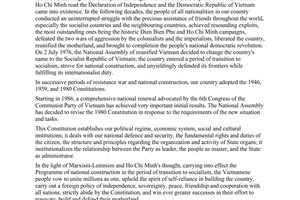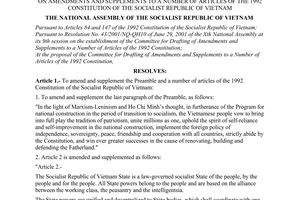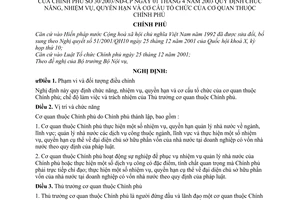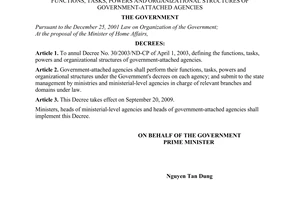Decree of Government No. 30/2003/ND-CP, prescribing the functions, tasks, powers and organizational structures of the agencies attached to the Government đã được thay thế bởi Decree no. 63/2009/ND-CP of July 29, 2009, annulling Decree No. 30/2003/ND-CP of April 1, 2003, defining the functions, tasks, powers and organizational structures of government-attached agencies và được áp dụng kể từ ngày 20/09/2009.
Nội dung toàn văn Decree of Government No. 30/2003/ND-CP, prescribing the functions, tasks, powers and organizational structures of the agencies attached to the Government
|
THE GOVERNMENT |
SOCIALIST REPUBLIC OF VIET NAM |
|
No: 30/2003/ND-CP |
Hanoi, April 1, 2003 |
DECREE
PRESCRIBING THE FUNCTIONS, TASKS, POWERS AND ORGANIZATIONAL STRUCTURES OF THE AGENCIES ATTACHED TO THE GOVERNMENT
THE GOVERNMENT
Pursuant to the 1992 Constitution of the
Socialist Republic of Vietnam, which was amended and supplemented under
Resolution No. 51/2001/NQ-QH10 bổ sung điều của Hiến pháp nước cộng hoà xã hội chủ nghĩa Việt Nam năm 1992">51/2001/QH10 of December 25, 2001 of the Xth National Assembly,
the 10th session;
Pursuant to the Law on Organization of the Government of December 25, 2001;
At the proposal of the Minister of the Interior,
DECREES:
Article 1.- Scope and objects of regulation
This Decree prescribes the functions, tasks, powers and organizational structures of the agencies attached to the Government; as well as the working regimes and responsibilities of the heads of the agencies attached to the Government.
Article 2.- Position and functions
The Government-attached agencies are set up by the Government and include:
1. Government-attached agencies which perform a number of tasks and exercise a number of powers of State management over branches and domains; perform the State management over public services within branches and domains as well as a number of specific tasks and powers to act as representatives of the owners of State capital portions at enterprises with State capital according to law provisions.
2. Government-attached agencies which are engaged in non-business activities in service of the Government’s task of State management or provide a number of public services of important characteristics and nature, which must be directly directed by the Government; perform a number of specific tasks and exercise a number of specific powers to act as representatives of the owners of State capital portions at enterprises with State capital according to law provisions.
Article 3.- The heads of the Government-attached agencies
1. A head of a Government-attached agency is the person who heads and leads that Government-attached agency; is answerable to the Prime Minister and/or the Government for the performance of the functions, tasks and powers of his/her agency;
The heads of the Government-attached agencies shall not promulgate legal documents.
The signing for promulgation of legal documents for the performance of the State management over the matters within the branches and domains, which are managed by the Government-attached agencies, shall be decided by the Prime Minister.
2. The deputy-heads of a Government-attached agency are those who assist the head in directing a number of working aspects and are answerable to the head for the assigned tasks. When the head is absent, a deputy head shall be authorized by the head to direct the agency’s operation.
The number of the deputy heads of each Government-attached agency shall not exceed 3. For special cases, the Prime Minister shall decide.
Article 4.- General tasks and powers
1. Regarding strategies, programs, plannings and plans:
a/ To submit to the Government and/or the Prime Minister the agencies’ strategies, plannings and programs, long-term, five-year and annual plans, as well as important projects; to organize the implementation of the strategies, plannings, programs and plans after they are approved;
b/ To participate in the evaluation of important schemes and projects within their professional domains at the request of the Government and/or the Prime Minister;
c/ To decide on the investment projects falling under their jurisdiction according to law provisions.
2. To promulgate, guide, inspect and organize the implementation of the professional standards, processes and procedures as well as economic and technical norms which are applied in the attached organizations and units according to the provisions of the legislation on State management over branches and domains.
3. Regarding international cooperation:
a/ To submit to the Government and/or the Prime Minister the negotiation on, signing of, accession to, and approval of, international treaties according to law provisions;
b/ To organize the implementation of international treaties as assigned by the Government or the Prime Minister;
c/ To organize and inspect the implementation of internationally-financed programs and projects according to law provisions;
d/ To send abroad officials, public servants and employees under their respective management as well as working missions according to international cooperation plans;
e/ To participate in international cooperation conferences, workshops, programs and plans according to law provisions.
4. To decide on and direct the implementation of administrative reform program according to the objectives and contents of the administrative reform program of the State, already approved by the Prime Minister.
5. To guide, inspect and be responsible for the organization of provision of public services according to law provisions.
6. Regarding the information and reporting regime:
a/ To organize the work of information, propagation and dissemination of the State’s political tasks, policies, regimes and laws within the assigned branches and domains;
b/ To abide by the regime of reporting to the Prime Minister or the branch- or domain-managing ministers according to the Government’s regulations.
7. Regarding organizational apparatus as well as State officials, public servants and employees:
a/ To submit to the Government for promulgation the Decree prescribing the functions, tasks, powers and organizational structures of their respective agencies;
b/ To submit to the Prime Minister for decision the establishment, reorganization or dissolution of the organizations and units within the organizational structures of their respective agencies;
c/ To define the functions, tasks, powers, organizational structures and working relationships of the attached organizations and units;
d/ To submit to the Prime Minister for decision the appointment, dismissal or demotion of the deputy-heads of the Government-attached agencies;
e/ To appoint for an office term of 5 years (to reappoint upon the expiry of such term), remove from office, or discipline the heads and the deputy-heads of the attached organizations and units according to law provisions; to prescribe the competence and responsibilities of the heads of the attached organizations and units;
f/ To decide on, and organize the implementation of, specific measures to enhance administrative disciplines among officials, public servants and employees under their respective management; to combat corruption, wastefulness and all signs of red-tape, authoritarianism and bumbledom in the agencies’ activities;
g/ To organize the work of training, fostering, recruitment, employment, transfer, rotation, retirement, commendation, disciplining and other regimes towards officials, public servants, employees and laborers under their respective management according to law provisions;
h/ To inspect the observance of policies, laws and the fulfillment of assigned tasks by officials, public servants, employees and laborers under their respective management; to settle complaints and denunciations related to officials and public servants under their respective management according to law provisions.
8. Regarding finance and asset management:
a/ To make the agencies’ annual budget estimates to be submitted to the competent State agencies according to law provisions;
b/ To decide on the allocation, inspect the expenditure and have to make the final settlement and/or the adjustment within the approved limit, of the approved total financial revenues and expenditures in order to perform the assigned tasks without changing the approved objectives and plans;
c/ To perform the financial management and accounting work according to law provisions;
d/ To efficiently manage and use the State-assigned assets.
Article 5.- Specific tasks and powers of a number of Government-attached agencies
1. To assume the prime responsibility or participate in the elaboration of bills, draft ordinances and other draft legal documents as assigned by the Government or the Prime Minister;
2. To organize the expertise, registration, granting of permits, diplomas and certificates, ranking of organizations and a number of other operations according to law provisions;
3. To examine and inspect the observance of law provisions in the assigned branches and domains by organizations and individuals; to propose the Prime Minister, ministers, heads of ministerial-level agencies, heads of agencies attached to the Government, People’s Councils or People’s Committees of provinces and centrally-run cities to handle, according to their competence, the regulations promulgated by the ministries, the ministerial-level agencies, the Government-attached agencies, the People’s Councils or the People’s Committees of the provinces and centrally-run cities, which are contrary to laws, ordinances and other legal documents on the branches and domains managed by their respective agencies;
4. To perform a number of specific tasks and exercise a number of specific powers to act as representatives of the owners of State capital portions at enterprises with State capital according to law provisions;
The Government shall specify the application of a number of tasks and powers defined in this Article in the Decree prescribing the functions, tasks, powers and organizational structure of each Government-attached agency.
Article 6.- Organizational structures
1. Organizational structures of the Government-attached agencies prescribed in Clause 1, Article 2 of this Decree are composed of:
a/ The Departments, the Offices and the Inspectorates;
b/ The Departments (not necessary for all agencies to have them);
c/ Non-business organizations.
2. Organizational structures of the Government-attached agencies prescribed in Clause 2, Article 2 of this Decree consist of:
a/ The Boards;
b/ The Offices;
c/ Non-business organizations.
3. Regarding the principles for organization and operation of the organizations within the organizational structures of the Government-attached agencies:
a/ Organizations prescribed in Clause 1 of this Article shall apply the organization and operation principles as those for the organizations within the organizational structures of the ministries and ministerial-level agencies defined in Articles 16, 17, 18, 19 and 21 of the Government’s Decree No. 86/2002/ND-CP of November 5, 2002 prescribing the functions, tasks, powers and organizational structures of the ministries and ministerial-level agencies;
b/ Organizations prescribed at Point a, Clause 2 of this Article shall have neither attached sections nor own seals. In cases where sections are necessary to be set up within these organizations, the Government shall specify them in the Decree defining the functions, tasks, powers and organizational structure of each Government-attached agency;
c/ The Offices of the Government-attached agencies prescribed in Clauses 1 and 2 of this Article shall have their own seals; the Offices’ organizational structures may be composed of sections.
4. The number of the deputy-heads of the organizations prescribed in Clauses 1 and 2 of this Article shall not exceed 3.
Article 7.- Working regimes and responsibilities of the heads of the Government-attached agencies
1. The Government-attached agencies shall work according to the regime of single leader, ensuring the principle of democratic centralism;
2. The heads of the Government-attached agencies shall decide on the promulgation of the agencies’ working regulations as well as the information and reporting regimes, and direct and inspect the implementation thereof;
3. The heads of the Government-attached agencies shall be answerable for the works assigned by the Government and/or the Prime Minister; for the management mistakes and the occurrence of corrupt and red-tape cases, which cause great losses and damage to organizations and units under their respective management;
4. The heads of the Government-attached agencies shall have to report to the Government and/or the Prime Minister on the organization and operation of the agencies under their respective management and the performance of the assigned tasks; consult with the Prime Minister on the matters falling beyond their competence; attend the Government’s meetings at the request of the Prime Minister; coordinate with ministers, heads of ministerial-level agencies and heads of other Government-attached agencies as well as central agencies of socio-political organizations in settling matters related to their respective functions, tasks and powers; settle proposals and petitions of the People’s Committees of provinces and centrally-run cities in accordance with the regulations on the assigned functions, tasks and powers.
Article 8.- Implementation effect
1. This Decree takes effect 15 days after its publication on the Official Gazette.
2. The ministers, the heads of the ministerial-level agencies, the heads of the agencies attached to the Government, and the presidents of the People’s Committees of the provinces and centrally-run cities shall have to implement this Decree.
|
ON BEHALF OF THE GOVERNMENT |





